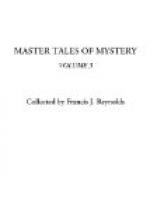“Dr. Scott is out,” reported the maid breathlessly, “but they are trying to locate him from his office, and if they do they will send him around immediately.”
A ring at the doorbell caused us to think that he had been found, but it proved to be the student to whom Kennedy had telephoned at his own laboratory. He was carrying a heavy suitcase and a small tank.
Kennedy opened the suitcase hastily and disclosed a little motor, some long tubes of rubber fitting into a small rubber cap, forceps, and other paraphernalia. The student quickly attached one tube to the little tank, while Kennedy grasped the tongue of the dead man with the forceps, pulled it up off the soft palate, and fitted the rubber cap snugly over his mouth and nose.
“This is the Draeger pulmotor,” he explained as he worked, “devised to resuscitate persons who have died of electric shock, but actually found to be of more value in cases of asphyxiation. Start the motor.”
The pulmotor began to pump. One could see the dead man’s chest rise as it was inflated with oxygen forced by the accordion bellows from the tank through one of the tubes into the lungs. Then it fell as the oxygen and the poisonous gas were slowly sucked out through the other tube. Again and again the process was repeated, about ten times a minute.
Dr. Burnham looked on in undisguised amazement. He had long since given up all hope. The man was dead, Medically dead, as dead as ever was any gas victim at this stage on whom all the usual methods of resuscitation had been tried and had failed.
Still, minute after minute, Kennedy worked faithfully on, trying to discover some spark of life and to fan it into flame. At last, after what seemed to be a half-hour of unremitting effort, when the oxygen had long since been exhausted and only fresh air was being pumped into the lungs and out of them, there was a first faint glimmer of life in the heart and a touch of color in the cheeks. Haswell was coming to. Another half-hour found him muttering and rambling weakly.
“The letter—the letter,” he moaned, rolling his glazed eyes about. “Where is the letter? Send for Grace.”
The moan was so audible that it was startling. It was like a voice from the grave. What did it all mean? Mrs. Martin was at his side in a moment.
“Father, father,—here I am—Grace. What do you want?”
The old man moved restlessly, feverishly, and pressed his trembling hand to his forehead as if trying to collect his thoughts. He was weak, but it was evident that he had been saved.
The pulmotor had been stopped. Craig threw the cap to his student to be packed up, and as he did so he remarked quietly, “I could wish that Dr. Scott had been found. There are some matters here that might interest him.”
He paused and looked slowly from the rescued man lying dazed on the bed toward Mrs. Martin. It was quite apparent even to me that she did not share the desire to see Dr. Scott, at least not just then. She was flushed and trembling with emotion. Crossing the room hurriedly she flung open the door into the hall.




